Papers by Pedro Mendes Loureiro
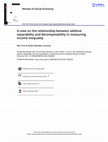
Review of Social Economy, 2020
This note introduces original technical results in the theoretical measurement of inequality by s... more This note introduces original technical results in the theoretical measurement of inequality by specifying the relationships between additive separability and homotheticity (of measures of welfare closely related to measures of inequality), and decomposability and homogeneity in measures of inequality. More specifically , an interrogation is made of the resonances and dissonances between the classic contributions of Atkinson and Shorrocks, which are key representatives, respectively, of the 'social welfare function' and the 'axiomatic' approaches to measuring inequality. In brief, in the presence of otherwise common assumptions , it is shown that additive separability and homotheticity of welfare are stronger combined conditions than decomposability and homogeneity (of degree zero) of income inequality. The gap between the two, however, can be closed by adding an extra term around total income to the measure of welfare, allowing for wider considerations of the relationship between social welfare, total income, and the distribution of individual incomes.

LATIN AMERICAN PERSPECTIVES, 2018
Under favorable external circumstances, the pragmatic political and economic strategy of Brazil's... more Under favorable external circumstances, the pragmatic political and economic strategy of Brazil's Partido dos Trabalhadores (Workers' Party-PT) helped to secure short-term political stability, boosted growth, and supported an unprecedented distribution of income. However, it also meant that the PT had to accommodate to rather than transform the constraints on growth in Brazil and that stability would involve unwieldy political alliances preventing deeper reforms. When it was confronted with deteriorating global economic conditions and increasingly ineffectual economic policies, the PT's strategy immobilized the party, facilitated the dissolution of its base of support, and expedited its ouster from power. The Brazilian experience suggests that political pragmatism can, within limits, support progressive economic change but that the outcomes depend heavily on external circumstances and the stability of the political coalitions supporting the administration. Em circunstâncias externas favoráveis, a pragmática estratégia política e econômica do Partido dos Trabalhadores (PT) ajudou a assegurar a estabilidade política no curto prazo, impulsionou o crescimento e apoiou uma distribuição de renda sem precedentes. No entanto, isso também significou que o PT teve que se acomodar a, em vez de transformar, as restrições ao crescimento no Brasil, e que a estabilidade envolveria alianças políticas comprometedoras, impedindo reformas mais profundas. Quando foi confrontada com a deterioração das condições econômicas globais e apresentando políticas econômicas cada vez mais ineficazes, a estratégia do PT imobilizou o partido, facilitou a dissolução de sua base de apoio e acelerou sua saída do poder. A experiência brasileira sugere que o pragma-tismo político pode, dentro de certos limites, apoiar a mudança econômica progressista, mas que os resultados dependem muito das circunstâncias externas e da estabilidade das coalizões políticas que apóiam a administração.

Latin American Perspectives, 2020
Brazil's social structure and associated distributive policies during the PT governments did not ... more Brazil's social structure and associated distributive policies during the PT governments did not depart from neoliberalism but rather implemented a poverty-reducing variant of it. Through minimum-wage hikes, conditional cash transfers, legislation driving financial innovation, and the subsidizing of privately provided for-profit services, state power was used to include individuals in ever-expanding formal circuits of commodity production and consumption. Deprivation in multiple dimensions was indeed reduced through these policies, but in the process social mobility came to mean exiting poverty, getting a formal low-skilled job, and accessing credit at lower interest rates to pay for state-subsidized private health and education.
A estrutura social do Brasil e as políticas distributivas associadas a ela durante os governos do PT não se afastaram do neoliberalismo, mas sim implementaram uma vari-ante de neoliberalismo redutora da pobreza. Por meio de aumentos do salário mínimo, transferências condicionais de renda, legislação que impulsionava a inovação financeira e o subsídio para serviços privados prestados com fins lucrativos, o poder do Estado foi usado para incluir indivíduos em crescentes circuitos formais de produção e consumo de mercadorias. A privação em múltiplas dimensões foi realmente reduzida por meio dessas políticas, mas neste processo a mobilidade social passou a significar sair da pobreza, con-seguir um emprego formal pouco qualificado e obter crédito a taxas de juros mais baixas para pagar pela saúde e educação privadas subsidiadas pelo Estado.
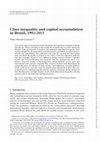
Cambridge Journal of Economics, 2019
This article explores the patterns of class inequality and capital accumulation in Brazil, showin... more This article explores the patterns of class inequality and capital accumulation in Brazil, showing the drivers and limits of the decline in inequality that occurred during the Workers' Party governments. It proposes that minimum wage hikes and greater social security changed the demand pattern and kick-started a cumulative causation process. Growth and redistribution thus reinforced each other for a period, and then spelled their own limits. As growth accelerated in the 2000s, a Gini decomposition indicates that class inequality decreased, but confined to changes between workers-capitalist income and social stratification were preserved. This also endogenously led to a re-gressive structural change, as low-productivity, labour-intensive services grew and international trade patterns worsened. This created a medium-term dependence on commodity prices for balance-of-trade solvency, and heightened cost-push inflation, which could not be overcome under the limited policy framework in place. The constrained basis for reducing inequality and the regressive structural change underscore that developmental strategies requires broad, multi-dimensional inequality-reducing measures and an encompassing catching-up project.

Latin American Perspectives, 2019
Under favorable external circumstances, the pragmatic political and economic strategy of Brazil's... more Under favorable external circumstances, the pragmatic political and economic strategy of Brazil's Partido dos Trabalhadores (Workers' Party—PT) helped to secure short-term political stability, boosted growth, and supported an unprecedented distribution of income. However, it also meant that the PT had to accommodate to rather than transform the constraints on growth in Brazil and that stability would involve unwieldy political alliances preventing deeper reforms. When it was confronted with deteriorating global economic conditions and increasingly ineffectual economic policies, the PT's strategy immobilized the party, facilitated the dissolution of its base of support, and expedited its ouster from power. The Brazilian experience suggests that political pragmatism can, within limits, support progressive economic change but that the outcomes depend heavily on external circumstances and the stability of the political coalitions supporting the administration.
Em circunstâncias externas favoráveis, a pragmática estratégia política e econômica do Partido dos Trabalhadores (PT) ajudou a assegurar a estabilidade política no curto prazo, impulsionou o crescimento e apoiou uma distribuição de renda sem precedentes. No entanto, isso também significou que o PT teve que se acomodar a, em vez de transformar, as restrições ao crescimento no Brasil, e que a estabilidade envolveria alianças políticas comprometedoras, impedindo reformas mais profundas. Quando foi confrontada com a deterioração das condições econômicas globais e apresentando políticas econômicas cada vez mais ineficazes, a estratégia do PT imobilizou o partido, facilitou a dissolução de sua base de apoio e acelerou sua saída do poder. A experiência brasileira sugere que o pragma-tismo político pode, dentro de certos limites, apoiar a mudança econômica progressista, mas que os resultados dependem muito das circunstâncias externas e da estabilidade das coalizões políticas que apóiam a administração.
It is argued in this post that, to tackle inequality and destitution going forward, Brazil needs ... more It is argued in this post that, to tackle inequality and destitution going forward, Brazil needs to go beyond the state-sponsored, yet ultimately commodified forms of social provisioning the PT implemented. Although a series of key policies did raise income in the bottom of the distribution, they failed to tackle top incomes or transform power structures, whilst sizeable stimuli were offered for the private sector to lead the provision of key services such as health, education and housing.
The chapter analyses the nature and the limits of the contributions the ‘Pink Tide’ made to the l... more The chapter analyses the nature and the limits of the contributions the ‘Pink Tide’ made to the living conditions of the working classes. Surveying Latin America, it argues that these governments chose the paths of least resistance to conduct reforms, with positive short-term results. Rising minimum wages and conditional cash transfer policies were the main levers, reducing income inequality and poverty. This relied on high commodity prices and caused deindustrialisation, however, while neo-corporatist class conciliation measures curbed popular self-organisation and the autonomy of social movements. The Pink Tide governments thus advanced an ‘inconsequential’ attempt at counter-hegemony, dependent on volatile short-term factors, without transforming the state and the economy in ways that would progressively establish structural conditions compatible with popular interests.
Structural change and economic dynamics, 2017
This article proposes a network model to replicate the behaviour of the profit rate in the long r... more This article proposes a network model to replicate the behaviour of the profit rate in the long run. Specifically, it accounts for the results of an empirical investigation of the profit rate in the US, which show that it has fractal properties and its complexity changes over time. The starting point of the model is Marx’s insights on the interplay between the tendency of the rate to fall and its countertendencies. It combines these insights with the persistent generation of new commodities – inventions – and a specific set of new branches of production that triggers technological revolutions. A simulation running this network model successfully replicates historical features of the system.
Review of Political Economy, 2017
There are new reasons for revisiting Marx’s elaboration on the rate of profit because contemporar... more There are new reasons for revisiting Marx’s elaboration on the rate of profit because contemporary debates provide findings from the MEGA Project, long-term data on the rate of profit, and tools for dealing with complexity and non-equilibrium systems. This article proposes that the interplay between the tendency and the countertendencies of the rate of profit to fall can be translated into a simple system of equations, one based on each chapter of Section Three of Capital—as if Marx sought to mathematically formalise his insights. This article reviews previous debates, presents data and runs a simulation model, showing that the rate of profit behaves as fractals.

Review of Keynesian Economics, 2016
This is a much welcome, thought-provoking book centred on proposing political and economic reform... more This is a much welcome, thought-provoking book centred on proposing political and economic reforms to the international order. The authors aptly traverse disciplinary boundaries, drawing on contributions from Economics, Political Science and International Political Economy, to put forward an ambitious book. It includes an interpretation of the financial crisis, an analysis of the possibilities of international cooperation and wide-ranging proposals of reforms. All of this is guided by the argument that it is imperative to reduce the power of certain nation-states and their economies, particularly the US, for the privilege of issuing the international reserve currency is behind many current economic problems. I find that the book’s greatest appeal is that it does not detain itself on small, day-to-day issues, but rather explores the benefits of much wider transformations. In a time when crises have been managed with incremental changes, if not generalised attacks on social rights, and any wider transformation is met with scepticism, the book highlights the need of envisioning and fighting for meaningful alternatives.
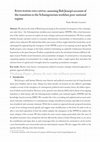
We discuss the work of Bob Jessop, focusing on the transition he proposes to the contemporary sta... more We discuss the work of Bob Jessop, focusing on the transition he proposes to the contemporary state form – the Schumpeterian workfare post-national regime (SWPR). After a brief presentation of the author’s account, we explore its main critiques and recent reformulations. We then consider whether Jessop’s narrative resorts to economic determinism, structuralism or functionalism, as some authors have indicated. We defend that while some traces of these might indeed be found, they can be sidestepped by approaching the emergence of the SWPR as part of an ongoing research agenda. We
finally propose some changes to the latter, related to developing an explicitly evolutionary theoretical framework, to the space that post-Fordism comprehends and to the articulation between different subtypes of post-Fordist social formations and accumulation strategies. A central point is not proposing competing regimes of accumulation for a single space, but rather a single regime that articulates the relevant forms of capital and is brought about by competing accumulation strategies.
História Econômica & História de Empresas, 2010
Este trabalho apresenta descrição detalhadados Registros Paroquiais de Terras (RPT) deMinas Gerai... more Este trabalho apresenta descrição detalhadados Registros Paroquiais de Terras (RPT) deMinas Gerais e analisa a relação entre espaço,população, estrutura fundiária e dinamismoeconômico em Minas. Afi rma-se o potencialdesta documentação e constata-se que não foiobjeto de estudo pormenorizado. Procura-sesituar os RPTs na História e na Historiografia, descrevendo-se sua estrutura, notadamenteos dados arrolados e sua frequência. Emseguida, por meio de dados agregados dosRPTs e das fontes populacionais, é analisadaa relação entre a propriedade da terra e suaconcentração e a distribuição da população.As conclusões apontam forte correlaçãoentre concentração fundiária e dinamismoeconômico.
Thesis by Pedro Mendes Loureiro
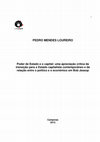
Dissertação (Mestrado em Economia). Instituto de Economia da Universidade Estadual de Campinas (IE/Unicamp), Jun 28, 2013
Encaminha-se com este trabalho uma discussão do pensamento de Bob Jessop, focada na transição que... more Encaminha-se com este trabalho uma discussão do pensamento de Bob Jessop, focada na transição que propõe para a forma estatal contemporânea e em sua compreensão da relação entre o econômico e o político. Com vistas a tanto, primeiramente se apresenta de maneira es-quemática como o autor entende a conformação tendencial do Schumpeterian workfare post-national regime (SWPR) a partir da crise do fordismo e de sua forma estatal, o Estado nacional keynesiano de bem-estar (ENKBE). Em seguida, apresenta-se o processo de construção teórica de Jessop e suas principais posições metateóricas, para então propor leitura de sua obra que des-taca como o autor constrói uma compreensão crescentemente complexa da relação entre o políti-co e o econômico. Vê-se como um ponto central nisso a recusa de tomar por dada a unidade subs-tantiva de seguidas dimensões das formações sociais, a exemplo do poder de Estado e das formas da acumulação de capital. Neste processo, o autor mobiliza cada vez mais numerosos conceitos estratégicos de grau de abstração intermediário a indicar a possiblidade contingente de garantir-se tal unidade. Interpreta-se, outrossim, que as reformulações que leva a cabo são centralmente mo-tivadas pela tentativa de evitar o politicismo. Feito isso, cobrem-se debates recentes relacionados à transição do ENKBE para o SWPR, bem como se discutem certas agendas de pesquisa associa-das ao tema. Por fim, apresenta-se reavaliação da proposta de transição de Jessop sob a luz da evolução teórica do próprio autor e das questões que emergem dos debates contemporâneos. Su-gere-se que as críticas de funcionalismo, estruturalismo e determinismo econômico que lhe foram dirigidas podem ser evitadas se feita referência a sua obra mais ampla. Neste sentido, argumenta-se que sua narrativa da emergência da forma estatal contemporânea pode ser melhor apreciada se vista como parte de uma agenda de pesquisa em aberto, que necessariamente deve transitar entre dimensões abstratas-simples e concreto-complexas. Indicam-se também algumas reorientações que se consideram mais frutíferas, nomeadamente: i) estudar o pós-fordismo no quadro de um “capitalismo variegado”; ii) desenvolver explicitamente um quadro teórico evolucionário para a interpretação da relação entre o político e o econômico; e iii) enxergar a articulação entre as dife-rentes formas do capital sob um único regime de acumulação a se desenvolver em cada tempo e espaço, e não através de regimes concorrentes.
We herein discuss the work of Bob Jessop, focusing on the transition he proposes to the contemporary state form and on his understanding of the relationship between the economic and the political. In order to do so, we first schematically present how the author suggests that the Schumpeterian workfare post-national regime (SWPR) tendentially emerges out of the crisis of Fordism and its state form – the Keynesian welfare national state (KWNS). We then present Jes-sop’s theory-building process and his main meta-theoretical positions. Following this, we pro-pose a reading of the author’s works that highlights how he develops a growingly complex under-standing of the relationship between the economic and the political. A central point in this re-gards how he successively comes to deny the a priori substantive unity of various aspects of so-cial formations, such as state power and the forms of capital accumulation, while in the same process mobilising an ever-greater number of middle-range strategic concepts that indicate the contingent possibility of securing such unity. We also suggest that most of Jessop’s theoretical shifts and reformulations in this dimension are fundamentally motivated by attempts at avoiding politicism. Having done so, we cover recent debates and research agendas related to the transition from the KWNS to the SWPR. We finally reassess Jessop’s proposed transition in light of his own theoretical evolution and of the issues that emerge from the contemporary debates. We sug-gest that the critiques some authors have voiced of functionalism, structuralism and economic determinism might be avoided if one refers to Jessop’s oeuvre as whole. In this sense, we propose that the latter’s account of the emergence of the current state form can be better appreciated if seen as part of an open research agenda, which must spiral through abstract-simple and concrete-complex levels. We also propose some shifts to this agenda, namely: i) to investigate post-Fordism in the framework of a ‘variegated capitalism’; ii) developing an explicitly evolutionary theoretical approach to the relationship between the economic and the political; and iii) to study the articulation of the different forms of capital under a single regime of accumulation in each space and time, and not through competing regimes.
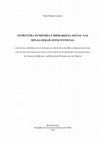
Monografia (Graduação). Curso de Ciências Econômicas da Faculdades de Ciências Econômicas da Universidade Federal de Minas Gerais (FACE/UFMG), Jun 2010
Este trabalho tem por objetivos apresentar descrição detalhada dos Registros Paroquiais de Terras... more Este trabalho tem por objetivos apresentar descrição detalhada dos Registros Paroquiais de Terras de Minas Gerais e analisar a relação agregada entre espaço, população, estrutura fundiária e dinamismo econômico regional em Minas. Afirma-se o dilatado potencial desta documentação para subsidiar diversas pesquisas em História Agrária e constata-se que os Registros não foram objeto de estudo que contemplasse de forma circunstanciada suas características fundamentais. Assim, procura-se situar os Registros Paroquiais de Terras na História e na Historiografia. Após revisão do contexto de produção dos Registros e de sua conexão com a Lei de Terras e com a modernização da propriedade fundiária, descreve-se a estrutura da documentação, notadamente a natureza dos dados arrolados e sua freqü.ncia. Em seguida, por meio de dados agregados coletados para todos os códices com Registros para Minas Gerais, de dados do Censo de 1831-32 e do Censo Imperial de 1872, e segundo regionalização para a província, é analisada a relação entre a propriedade da terra e sua concentração e a distribuição da população no espaço mineiro. Através de estimações econométricas, as conclusões apontam para forte correlação entre concentração fundiária e dinamismo econômico. Finalmente, utilizando registros coletados integralmente para oito regiões mineiras estuda-se as diferentes características das propriedades e seus proprietários, relacionando os atributos às condições sócio-econômicas mais amplas. Descreve-se a estrutura fundiária das regiões estudas, analisando como se conformava a estratificação da apropriação fundiária e as bases sobre as quais se processaria a modernização da propriedade. Conclui-se que sobreposta à generalizada hierarquização do acesso à terra concorriam outros processos diferenciando o cenário provincial quanto a, entre outros, as formas de apropriação predominantes, a diferença na pressão sobre a propriedade fundiária e os variados graus de dependência e indivisão da propriedade.










Uploads
Papers by Pedro Mendes Loureiro
A estrutura social do Brasil e as políticas distributivas associadas a ela durante os governos do PT não se afastaram do neoliberalismo, mas sim implementaram uma vari-ante de neoliberalismo redutora da pobreza. Por meio de aumentos do salário mínimo, transferências condicionais de renda, legislação que impulsionava a inovação financeira e o subsídio para serviços privados prestados com fins lucrativos, o poder do Estado foi usado para incluir indivíduos em crescentes circuitos formais de produção e consumo de mercadorias. A privação em múltiplas dimensões foi realmente reduzida por meio dessas políticas, mas neste processo a mobilidade social passou a significar sair da pobreza, con-seguir um emprego formal pouco qualificado e obter crédito a taxas de juros mais baixas para pagar pela saúde e educação privadas subsidiadas pelo Estado.
Em circunstâncias externas favoráveis, a pragmática estratégia política e econômica do Partido dos Trabalhadores (PT) ajudou a assegurar a estabilidade política no curto prazo, impulsionou o crescimento e apoiou uma distribuição de renda sem precedentes. No entanto, isso também significou que o PT teve que se acomodar a, em vez de transformar, as restrições ao crescimento no Brasil, e que a estabilidade envolveria alianças políticas comprometedoras, impedindo reformas mais profundas. Quando foi confrontada com a deterioração das condições econômicas globais e apresentando políticas econômicas cada vez mais ineficazes, a estratégia do PT imobilizou o partido, facilitou a dissolução de sua base de apoio e acelerou sua saída do poder. A experiência brasileira sugere que o pragma-tismo político pode, dentro de certos limites, apoiar a mudança econômica progressista, mas que os resultados dependem muito das circunstâncias externas e da estabilidade das coalizões políticas que apóiam a administração.
finally propose some changes to the latter, related to developing an explicitly evolutionary theoretical framework, to the space that post-Fordism comprehends and to the articulation between different subtypes of post-Fordist social formations and accumulation strategies. A central point is not proposing competing regimes of accumulation for a single space, but rather a single regime that articulates the relevant forms of capital and is brought about by competing accumulation strategies.
Thesis by Pedro Mendes Loureiro
We herein discuss the work of Bob Jessop, focusing on the transition he proposes to the contemporary state form and on his understanding of the relationship between the economic and the political. In order to do so, we first schematically present how the author suggests that the Schumpeterian workfare post-national regime (SWPR) tendentially emerges out of the crisis of Fordism and its state form – the Keynesian welfare national state (KWNS). We then present Jes-sop’s theory-building process and his main meta-theoretical positions. Following this, we pro-pose a reading of the author’s works that highlights how he develops a growingly complex under-standing of the relationship between the economic and the political. A central point in this re-gards how he successively comes to deny the a priori substantive unity of various aspects of so-cial formations, such as state power and the forms of capital accumulation, while in the same process mobilising an ever-greater number of middle-range strategic concepts that indicate the contingent possibility of securing such unity. We also suggest that most of Jessop’s theoretical shifts and reformulations in this dimension are fundamentally motivated by attempts at avoiding politicism. Having done so, we cover recent debates and research agendas related to the transition from the KWNS to the SWPR. We finally reassess Jessop’s proposed transition in light of his own theoretical evolution and of the issues that emerge from the contemporary debates. We sug-gest that the critiques some authors have voiced of functionalism, structuralism and economic determinism might be avoided if one refers to Jessop’s oeuvre as whole. In this sense, we propose that the latter’s account of the emergence of the current state form can be better appreciated if seen as part of an open research agenda, which must spiral through abstract-simple and concrete-complex levels. We also propose some shifts to this agenda, namely: i) to investigate post-Fordism in the framework of a ‘variegated capitalism’; ii) developing an explicitly evolutionary theoretical approach to the relationship between the economic and the political; and iii) to study the articulation of the different forms of capital under a single regime of accumulation in each space and time, and not through competing regimes.
A estrutura social do Brasil e as políticas distributivas associadas a ela durante os governos do PT não se afastaram do neoliberalismo, mas sim implementaram uma vari-ante de neoliberalismo redutora da pobreza. Por meio de aumentos do salário mínimo, transferências condicionais de renda, legislação que impulsionava a inovação financeira e o subsídio para serviços privados prestados com fins lucrativos, o poder do Estado foi usado para incluir indivíduos em crescentes circuitos formais de produção e consumo de mercadorias. A privação em múltiplas dimensões foi realmente reduzida por meio dessas políticas, mas neste processo a mobilidade social passou a significar sair da pobreza, con-seguir um emprego formal pouco qualificado e obter crédito a taxas de juros mais baixas para pagar pela saúde e educação privadas subsidiadas pelo Estado.
Em circunstâncias externas favoráveis, a pragmática estratégia política e econômica do Partido dos Trabalhadores (PT) ajudou a assegurar a estabilidade política no curto prazo, impulsionou o crescimento e apoiou uma distribuição de renda sem precedentes. No entanto, isso também significou que o PT teve que se acomodar a, em vez de transformar, as restrições ao crescimento no Brasil, e que a estabilidade envolveria alianças políticas comprometedoras, impedindo reformas mais profundas. Quando foi confrontada com a deterioração das condições econômicas globais e apresentando políticas econômicas cada vez mais ineficazes, a estratégia do PT imobilizou o partido, facilitou a dissolução de sua base de apoio e acelerou sua saída do poder. A experiência brasileira sugere que o pragma-tismo político pode, dentro de certos limites, apoiar a mudança econômica progressista, mas que os resultados dependem muito das circunstâncias externas e da estabilidade das coalizões políticas que apóiam a administração.
finally propose some changes to the latter, related to developing an explicitly evolutionary theoretical framework, to the space that post-Fordism comprehends and to the articulation between different subtypes of post-Fordist social formations and accumulation strategies. A central point is not proposing competing regimes of accumulation for a single space, but rather a single regime that articulates the relevant forms of capital and is brought about by competing accumulation strategies.
We herein discuss the work of Bob Jessop, focusing on the transition he proposes to the contemporary state form and on his understanding of the relationship between the economic and the political. In order to do so, we first schematically present how the author suggests that the Schumpeterian workfare post-national regime (SWPR) tendentially emerges out of the crisis of Fordism and its state form – the Keynesian welfare national state (KWNS). We then present Jes-sop’s theory-building process and his main meta-theoretical positions. Following this, we pro-pose a reading of the author’s works that highlights how he develops a growingly complex under-standing of the relationship between the economic and the political. A central point in this re-gards how he successively comes to deny the a priori substantive unity of various aspects of so-cial formations, such as state power and the forms of capital accumulation, while in the same process mobilising an ever-greater number of middle-range strategic concepts that indicate the contingent possibility of securing such unity. We also suggest that most of Jessop’s theoretical shifts and reformulations in this dimension are fundamentally motivated by attempts at avoiding politicism. Having done so, we cover recent debates and research agendas related to the transition from the KWNS to the SWPR. We finally reassess Jessop’s proposed transition in light of his own theoretical evolution and of the issues that emerge from the contemporary debates. We sug-gest that the critiques some authors have voiced of functionalism, structuralism and economic determinism might be avoided if one refers to Jessop’s oeuvre as whole. In this sense, we propose that the latter’s account of the emergence of the current state form can be better appreciated if seen as part of an open research agenda, which must spiral through abstract-simple and concrete-complex levels. We also propose some shifts to this agenda, namely: i) to investigate post-Fordism in the framework of a ‘variegated capitalism’; ii) developing an explicitly evolutionary theoretical approach to the relationship between the economic and the political; and iii) to study the articulation of the different forms of capital under a single regime of accumulation in each space and time, and not through competing regimes.